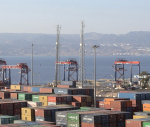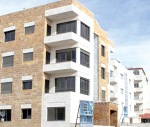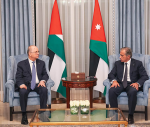You are here
Politics dividing East from West — once again
Feb 15,2023 - Last updated at Feb 15,2023
At a time the entire world community should unite to provide aid to all victims of the massive February 6th earthquakes which devastated south-eastern Turkey and north-western Syria, politics is dividing East from West — once again. Scores of rescue teams, tonnes of material aid and millions of dollars have poured into NATO member Turkey, the epicentre of the first 7.8 magnitude quake, the strongest in the region for four decades.
There has been wide publicity about the terrible conditions faced by civilians in Syria's northwest Idlib province, where local "White Helmets" civil defence teams have been solely responsible for rescuing people buried under the rubble of collapsed buildings. Heavy digging equipment, tents, medical supplies and food were not initially delivered through Turkey's Bab Al Hawa crossing due to quake damage on access roads. This state of affairs has made Idlib a constant focus of global media which report the area is under the control of "rebels". The "rebels" are rarely identified as Al Qaeda offshoot Hay'at Tahrir Al Sham (HTS) which was branded a "foreign terrorist" organisation by the UN and US.
Instead, the US and European Union continue to sanction Syrians who live in the 70 per cent of their country held by the government of President Bashar Assad. While Western powers claim sanctions do not impede food, medical supplies and humanitarian assistance, this is a lie. Since fighting in the civil conflict and proxy war in 2016-17, Syria has been prohibited by sanctions from accessing funds and material to reconstruct infrastructure, public buildings, schools and hospitals destroyed or damaged by warfare. In the last three years, sanctions have deprived the majority of Syrians of fuel, essential foodstuffs and life-saving medications as foreign firms are afraid to deal with the Syrian government because of the US Caesar Act of 2019 which punishes individuals and entities dealing with the government. Ahead of the quake, deprivation had driven 90 per cent of Syrians below the poverty line.
The quake drove Assad to apply to the European Union for assistance under the bloc's Civil Protection Mechanism and $3.7 million was allocated “shelter, water and sanitation, and various health items” as well as support of search-and-rescue operations. Germany then announced aid valued at $28 million. There has even been a positive response from the bitterly anti-Assad Biden administration which has waived sanctions for 180 days on Syrian imports of medicine, food, tents and other supplies for quake victims.
Assad has agreed to the delivery of aid to Idlib via government-held territory. If politics did not intervene this could be a simple matter as the airports at Latakia and Aleppo are close to Idlib. He also ordered the opening of two crossings into Syria from Turkey. However, HTS — which is also sanctioned by the US-barred deliveries to Idlib from government-controlled areas. An HTS source told Reuters last weekend, “We won’t allow the regime to take advantage of the situation to show they are helping.” It is not clear whether HTS chief Abu Mohammed al-Julani upholds this ban. Perhaps he does not need to since two other channels from Turkey are set to open.
While the world has focused on quake devastation in southern Turkey and Idlib, some information is trickling out about deaths and destruction inflicted on Aleppo, Latakia, Tartous and Hama. An estimated 200,000 people have been rendered homeless. Al Mayadeen's correspondents have reported that more than 50 buildings — in addition to those which collapsed — will have to be demolished in Aleppo where the local search and rescue mission has ended and the authorities are shifting to finding shelter, food, clothing and schooling for survivors. At least 4,000 homes have been damaged in Hama. Urgent aid for Syrian victims has been largely provided by Arab rather than Western governments which have rushed search and rescue teams, equipment and material aid to Turkey. As in every situation there are double standards and double talk.
Turkey has said the cost of post-quake reconstruction at $50 billion; a Turkish business group put that figure at $84 billion. Having secured some notice for the plight of Syrians, Assad has urged the US and Europe to lift sanctions on reconstruction of war devastation and quake damage. The UN has estimated the cost of rebuilding war damage alone at $250 billion, a small proportion of this huge sum is to be covered by a reconstruction tax levied for years on Syrians living in government-held areas. Syria's Western sanctioned allies, Russia and Iran, cannot contribute massively and the US and Europe have not only maintained but also tightened sanctions despite calls from humanitarian agencies and UN officials to revoke sanctions.
Following a visit to Syria last November, UN special human rights rapporteur Alena Douhan stated, "I am struck by the pervasiveness of the human rights and humanitarian impact of the unilateral coercive measures imposed on Syria and the total economic and financial isolation of a country whose people are struggling to rebuild a life with dignity, following the decade-long war.” She urged, "The immediate lifting of all unilateral sanctions that severely harm human rights and prevent any efforts for early recovery, rebuilding and reconstruction.”













